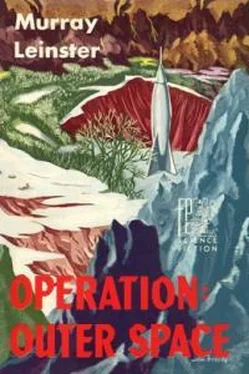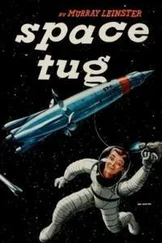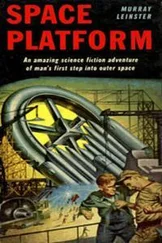"I should have figured that! He bought his great discovery from you, eh? And that's what he gets frustrated about!"
Cochrane snapped:
"I thought you psychiatrists knew the facts of life, Bill! Dabney's not unusual in my business! He's almost a typical sponsor!"
"When you ask me to throw away starships," said Jones coldly, "for a publicity feature, I don't play. I won't take the credit for the field away from Dabney. I sold him that with my eyes open. But starships are more important than a fool's hankering to be famous! He'd never try it! He'd be afraid it wouldn't work! I don't play!"
Holden said stridently:
"I don't give a damn about any deal you made with Dabney! But if you can get us to the stars—all us humans who need it—you've got to!"
Jones said, again calmly:
"I'm willing. Make me an offer—not cash, but a chance to do something real—not just a trick for a neurotic's ego!"
Cochrane grinned at him very peculiarly.
"I like your approach. You've got illusions. They're nice things to have. I wouldn't mind having some myself. Bill," he said to Dr. William Holden, "how much nerve has Dabney?"
"Speaking unprofessionally," said Holden, "he's a worm with wants. He hasn't anything but cravings. Why?"
Cochrane grinned again, his head cocked on one side.
"He wouldn't take part in an enterprise to reach the stars, would he?" When Holden shook his head, Cochrane said zestfully, "I'd guess that the peak of his ambition would be to have the credit for it if it worked, but he wouldn't risk being associated with it until it had worked! Right?"
"Right," said Holden. "I said he was a worm. What're you driving at?"
"I'm outlining what you're twisting my arm to make me do," said Cochrane, "in case you haven't noticed. Bill, if Jones can really make a ship go faster than light—"
"I can," repeated Jones. "I simply didn't think of the thing in connection with travel. I only thought of it for signalling."
"Then," said Cochrane, "I'm literally forced, for Dabney's sake, to do something that he'd scream shrilly at if he heard about it. We're going to have a party, Bill! A party after your and my and Jones' hearts!"
"What do you mean?" demanded Holden.
"We make a production after all," said Cochrane, grinning. "We are going to take Dabney's discovery—the one he bought publicity rights to—very seriously indeed. I'm going to get him acclaim. First we break a story of what Dabney's field means for the future of mankind—and then we prove it! We take a journey to the stars! Want to make your reservations now?"
"You mean," said West incredulously, "a genuine trip? Why?"
Cochrane snapped at him suddenly.
"Because I can't kid myself any more," he rasped. "I've found out how little I count in the world and the estimation of Kursten, Kasten, Hopkins and Fallowe! I've found out I'm only a little man when I thought I was a big one, and I won't take it! Now I've got an excuse to try to be a big man! That's reason enough, isn't it?"
Then he glared around the small laboratory under the dust–heap. He was irritated because he did not feel splendid emotions after making a resolution and a plan which ought to go down in history—if it worked. He wasn't uplifted. He wasn't aware of any particular feeling of being the instrument of destiny or anything else. He simply felt peevish and annoyed and obstinate about trying the impossible trick.
It annoyed him additionally, perhaps, to see the expression of starry–eyed admiration on Babs' face as she looked at him across the untidy laboratory table, cluttered up with beer–cans.
It is a matter of record that the American continents were discovered because ice–boxes were unknown in the fifteenth century. There being no refrigeration, meat did not keep. But meat was not too easy to come by, so it had to be eaten, even when it stank. Therefore it was a noble enterprise, and to the glory of the kingdoms of Castile and Aragon, to put up the financial backing for even a crackpot who might get spices cheaper and thereby make the consumption of slightly spoiled meat less unpleasant. Which was why Columbus got three ships and crews of jailbirds for them from a government still busy trying to drive the Moors out of the last corner of Spain.
This was a precedent for the matter on hand now. Cochrane happened to know the details about Columbus because he'd checked over the research when he did a show on the Dikkipatti Hour dealing with him. There were more precedents. The elaborate bargain by which Columbus was to be made hereditary High Admiral of the Western Oceans, with a bite of all revenue obtained by the passage he was to discover—he had to hold out for such terms to make the package he was selling look attractive. Nobody buys anything that is underpriced too much. It looks phoney. So Cochrane made his preliminaries rather more impressive than they need have been from a strictly practical point of view, in order to make the enterprise practical from a financial aspect.
There was another precedent he did not intend to follow. Columbus did not know where he was going when he set sail, he did not know where he was when he arrived at the end of his voyage, and he didn't know where he'd been when he got back. Cochrane expected to improve on the achievement of the earlier explorer's doings in these respects.
He commandeered the legal department of Kursten, Kasten, Hopkins, and Fallowe to set up the enterprise with strict legality and discretion. There came into being a corporation called "Spaceways, Inc." which could not possibly be considered phoney from any inspection of its charter. Expert legal advice arranged that its actual stock–holders should appear to be untraceable. Deft manipulation contrived that though its stock was legally vested in Cochrane and Holden and Jones—Cochrane negligently threw in Jones as a convenient name to use—and they were officially the owners of nearly all the stock, nobody who checked up would believe they were anything but dummies. Stockholdings in West's, and Jamison's and Bell's names would look like smaller holdings held for other than the main entrepreneurs. But these stock–holders were not only the legal owners of record—they were the true owners. Kursten, Kasten, Hopkins and Fallowe wanted no actual part of Spaceways. They considered the enterprise merely a psychiatric treatment for a neurotic son–in–law. Which, of course, it was. So Spaceways, Inc., quite honestly and validly belonged to the people who would cure Dabney of his frustration—and nobody at all believed that it would ever do anything else. Not anybody but those six owners, anyhow. And as it turned out, not all of them.
The psychiatric treatment began with an innocent–seeming news–item from Lunar City saying that Dabney, the so–and–so scientist, had consented to act as consulting physicist to Spaceways, Inc., for the practical application of his recent discovery of a way to send messages faster than light.
This was news simply because it came from the moon. It got fairly wide distribution, but no emphasis.
Then the publicity campaign broke. On orders from Cochrane, Jamison the extrapolating genius got slightly plastered, in company with the two news–association reporters in Lunar City. He confided that Spaceways, Inc., had been organized and was backed to develop the Dabney faster–than–light–signalling field into a faster–than–light–travel field. The news men pumped him of all his extrapolations. Cynically, they checked to see who might be preparing to unload stock. They found no preparations for stock–sales. No registration of the company for raising funds. It wasn't going to the public for money. It wasn't selling anybody anything. Then Cochrane refused to see any reporters at all, everybody connected with the enterprise shut up tighter than a clam, and Jamison vanished into a hotel room where he was kept occupied with beverages and food at Dabney's father–in–law's expense. None of this was standard for a phoney promotion deal.
Читать дальше






